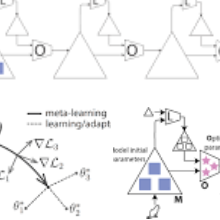We formulate meta learning using information theoretic concepts; namely, mutual information and the information bottleneck. The idea is to learn a stochastic representation or encoding of the task description, given by a training set, that is highly informative about predicting the validation set. By making use of variational approximations to the mutual information, we derive a general and tractable framework for meta learning. This framework unifies existing gradient-based algorithms and also allows us to derive new algorithms. In particular, we develop a memory-based algorithm that uses Gaussian processes to obtain non-parametric encoding representations. We demonstrate our method on a few-shot regression problem and on four few-shot classification problems, obtaining competitive accuracy when compared to existing baselines.
翻译:我们利用信息理论概念(即相互信息和信息瓶颈)制定元学习概念,即信息理论概念;相互信息和信息瓶颈。我们的想法是学习一套训练材料对任务说明的随机表述或编码,该套培训材料对预测验证集非常丰富。我们利用对相互信息的变异近似,得出一个通用和可移植的元学习框架。这个框架统一了现有的梯度算法,并使我们能够得出新的算法。特别是,我们开发了一种基于记忆的算法,利用高山进程获得非参数编码表示法。我们展示了我们处理微小回归问题和四个微小分类问题的方法,在与现有基线相比时获得了竞争性准确性。





